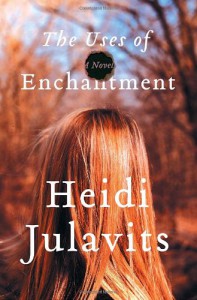Review: The Uses of Enchantment

This is a review, a written assessment of a particular product—in this case a book—that is meant to highlight its strengths and inform others of its potential flaws. Reviews can be great: reviews can catch the attention of the consumers, they give tried and true evidence that a product is worth buying (or not buying). This is also the greatest flaw of a review. Send out a message again and again that a product is flawed and the consumers will stop buying, even if that product is truly great.
I first came across The Uses of Enchantment seven years ago while shelving books at the library. The cover enticed me immediately. The appearance of a hole burnt in the dust jacket, the colors, the beautiful hair, the font (great work on the cover of this one, cover designer peoples!) The novel's description completely pulled me in. Then I noticed other books by the same author on the shelf, and I read their descriptions and I knew, right then, I had found a new favorite author.
Except when I got home and added the book to my Goodreads there was a huge red flag: The Uses of Enchantment had a rating that was barely rising above 3.0. And Julavits' other books weren't doing much better. The reviews blasted the book; there were so many one to three star ratings. The reviews were peppered with phrases like “I hated this book” and “what a waste of time.” And so I did what any intelligent consumer would do—I put the book on my “I'll probably never read this, but I'll keep it on my shelf because it's so pretty” shelf. My putting aside this book had nothing to do with following the masses, it had to do with experience. When I look back at the books I have read which have the lowest overall ratings, I must say that I disliked most of them. Prior to The Uses of Enchantment, the only book with a rating less than 3.25 that I absolutely loved was Rowling's polarizing The Casual Vacancy. I had too many other “good” books to read to waste time on something I'd probably hate. Yet, that small voice of hope from seven years ago would nag at me occasionally, telling me I'd never know if I didn't give it a try. Finally, I gave in.
I'm not quite sure why I finally decided to give The Uses of Enchantment a go, but I'm glad I did. The book was phenomenal. It's possible that my super low expectations buoyed the book considerably, but I don't believe so; I think I would've liked this novel regardless of the reviews. First of all, the prose is amazing. Julavits writes with such beauty. I was reminded of two other authors whose work I enjoy but who also receive many poor reviews: Hannah Pittard and Meg Wolitzer. Perhaps there is something in the style of these authors that repulses some readers, but whatever it is, I want more of it. When I ponder the negative comments of others, and the complaints I personally disagree with, I think mostly of comments about “how boring” these works are, how “nothing happens,” or how “unresolved” they are. I would agree that not much happens in these books, and in the case of Pittard's first novel the lack of “anything” happening was the only barrier to a five-star review, but I would argue that enough happens, especially in the characters themselves. And perhaps that is the distinction here. Are these novel's largely character and language driven? I would say, yes. Apparently too much so for many readers. Personally, I find novels with absolutely no plot boring as well, but light plot is acceptable. Add some great character development and some wonderfully spun sentences and I'm hooked.
As far as the argument that The Uses of Enchantment is unresolved, I disagree. Does the reader get a clear answer as to what happened or didn't happen? No, not really. But I think it can be deduced what likely occurred, and this is good enough for me. Study the psychology of these characters, pay attention to this “wronged-woman project” the school participates in, and I think that not only does the “what might have happened” fall into place, but also the importance of it not mattering. The brilliance of the novel is in the not knowing. What about Dora? Mary is asking. What about Bettina Spencer? What about all of us women who have been wrongly accused? Does it matter if all our facts fall into line, or is it enough that we are simply hurting? That's what I walked away with anyhow. And I applaud Julavits for a well-orchestrated story.
So, take it from me, kids. Ratings can good, but they also be a tool of the devil. I mean, come on, this poignant story of a confused adolescent girl is worth only 3.04 stars, but Twilight, a story about an adolescent girl who plays baseball with vampires because she's so disturbed, wracks up 3.56 stars? Heed the advice of a book snob: Ratings are of the devil!
 1
1



